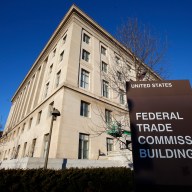TORONTO – The Toronto stock market continues to demonstrate resilience as a key week of U.S. earnings encouraged investors that an economic recovery is in the works.
The S&P/TSX composite index finished last week up 0.6 per cent, but investors had sent the market up a solid 4.36 per cent the previous week in anticipation that American companies would report stronger earnings and revenue.
“After all, the Dow and the S&P did get to their 2009 highs this year and the TSX was close behind (last week),” said Doug Porter, deputy chief economist at BMO Capital Markets.
“I don’t think the early stages of the earnings season were terribly hard on the market. If anything, I think the net reaction has been mildly positive.”
There were some bumps during the week as drug company Johnson & Johnson disappointed on revenue.
“And frankly I don’t see that as being too shocking given that we still are very much in the early stages of the recovery and the recovery has not exactly been knocking the doors down,” said Porter.
Disappointing earnings from Bank of America Corp. and General Electric Co. reminded investors that businesses and consumers are still struggling to pay off their debts. But Goldman Sachs Group, Google Inc. and computer chip maker Advanced Micro Devices all reassured investors, who will absorb more key American reports this week.
The Canadian earnings season doesn’t go into high gear until the end of the month.
Investors will also be watching the U.S. dollar this week. Persistent weakness in the greenback last week pushed the Canadian dollar within about two cents of parity for the first time in almost a year and a half.
And currency softness pushed crude oil prices up to its high of the year on Thursday to more than US$78 a barrel, and helped send the TSX energy index 4.3 cent higher last week.
But these higher oil prices are getting to a level that makes economists worry about how high crude could depress a recovery.
“We are starting to get into the danger zone where the strength of oil can actually start feeding back onto itself and actually weighing on the outlook to some extent,” added Porter.
“Oil prices are still down from a year ago but they’ve more than doubled from the lows earlier this year and it’s creeping onto the worry list, I think, just in terms of the hit it can deliver to consumer confidence and the fact that it’s likely going to start pushing up inflation in the months ahead.”
But Porter observed that even if the greenback was suddenly to strengthen, oil prices likely wouldn’t fall alongside.
“The strength is clearly not being driven by pure demand fundamentals but there is a very important supply story here as well,” he said.
“There are very real long term supply concerns and there’s a lot of buying right now that is basically locking up oil for the long term. People just don’t believe it’s going to stay low for long.”
The Canadian dollar peaked in the middle of last week, when it closed at 97.48 cents.
U.S. dollar weakness has contributed largely to the recent sharp rise, as has sharply higher commodity prices and positive economic data.
“The speed with which the currency has come back has been a surprise,” said Porter, noting that the currency is up roughly 25 per cent in the space of a little over seven months.
The recent sharp rise is a worry to the Bank of Canada, which has warned that such a spike could undercut growth.
The central bank makes its next interest rate announcement on Tuesday. The central bank will likely keep its key overnight policy rate at 0.25 per cent. As recently as last month, it repeated its promise to keep it at the lowest possible level until at least next July.
And while it is concerned about the flight of the loonie, Porter observed that there is not a great deal the bank can do about it right now, aside from publicly expressing its concern.
“They’re talked about intervening, which is an extreme thing but on the interest rate front, there’s very little banks can do now,” he said.
“It’s really more the tone of the comments.”
















